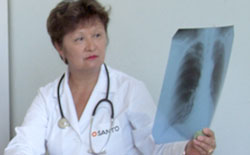Dr Raikhan Kaltaevna Djuzenova is a senior doctor at Kokshe No. 2 family outpatient clinic in Kokshetau, Kazakhstan

Dr Raikhan Kaltaevna Djuzenova
"After earning my midwife’s diploma from medical college, I entered the medical institute. I worked as a midwife while continuing my studies and then graduated as a specialist obstetrician-gynecologist. I am now working as a senior doctor. This family outpatient clinic on the outskirts of Kokshetau serves a population of more than 21 000.
I have lived through all the stages of the health care reforms in Kokshetau, and I have fallen in love with the family approach to our work, where the obstetrician-gynecologist, the general practitioner and the pediatrician all work together, that is, each specialist is concerned with the health of the whole family. That is why I agreed to take on, at my own risk and peril, the responsibilities of a senior doctor. I think that my experience and my efforts do mean something, they are my contribution to the development of family medicine in my beloved town.
I have been working for more than 35 years now, but I believe that a doctor should learn constantly, that is, every day you meet patients, you improve your professional level. That's why it is a real pleasure for me to see satisfied patients and no complaints from the people we are here to serve!
Of course, my work is quite complex, and the greatest problem is preventive care, for both children and adults, the promotion of healthy living. I think that, the less people have to come in to see doctors, and the more we go out into the population, the better the public health indicators will be and, as a result, we will reduce crowding and congestion in the clinic.
The health care system in our country is not yet effective enough, despite the reform process. There are still problems that have not been solved. One of the main problems is the lack of qualified staff, and this is a particularly sensitive issue. Then there are the problems of low salaries, the lack of incentives, the inadequacy of the infrastructure, and the lack of motivation to improve one’s professional expertise. Sometimes you get tired of all the problems, but you still, actually quite often, think about improving your own professional level and learning how to use new technologies, the latest achievements in countries where medicine is at a higher level.
I look to the future with optimism: my patients expect satisfaction from the services we provide, that is, accessible, good quality, free medical care, when they need it. But people’s expectations are not all the same. People who are ill expect and hope that they will get better, their hope being only the doctor. But people who are healthy do not bother with prevention; they believe that the responsibility for their health lies with the doctor. Only a small proportion of people live healthily, think about prevention and thus behave responsibly in respect of their health."



